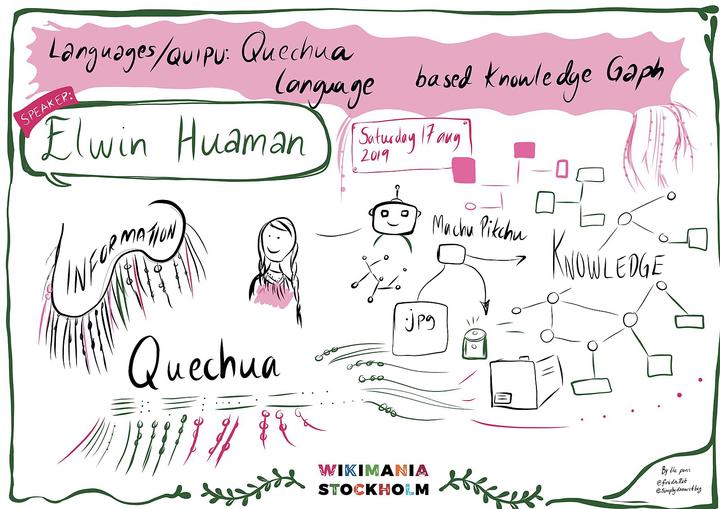 Photo by @FridaRit and @Simplydrawitbig
Photo by @FridaRit and @SimplydrawitbigAbstract
With QUIPU we are trying to create a knowledge graph that can preserve as much as possible all the Quechua knowledge in a structured format. Which has a lot of advantages. For instance, it is possible to create a dictionary in Quechua language using the current Quechua wiktionary, create multimedia content using Quechua-Wikipedia, as well as, it is possible to use all those structured data for creating chatbots using DialogFlow technology and help old people to keep updated regarding new technologies.
Description
Quechua has been spoken in various countries of South America since the Inca empire was founded (i.e. more than 600 years ago). Nowadays, more than 12 million people speak Quechua around the world and the recent census in Peru has shown an increasing 0.4% in favour of Quechua speakers.
On the one hand, there is an effort by the governments like Bolivia, Peru, and Ecuador to promote the Quechua as a spoken language (at least they are trying) by producing Movies, TV shows, Newspapers, Documentaries which have the Quechua as the original language.
On the other hand, There is an increasing number of digital illiteracy that affects old people in those countries, specifically the Quechua speakers. And nobody is taking care of them.
With QUIPU we are trying to create a knowledge graph that can preserve as much as possible all the Quechua knowledge in a structured format. Which has a lot of advantages. For instance, it is possible to create a dictionary in Quechua language using the current Quechua wiktionary, create multimedia content using Quechua-Wikipedia, as well as, it is possible to use all those structured data for creating chatbots using DialogFlow technology and help old people to keep updated regarding new technologies.
Of course, it is not a straight forward task, but there are possibilities to save our culture and bring equality right to indigenous communities.
Relationship to the theme
This session will address the conference theme — Wikimedia, Free Knowledge and the Sustainable Development Goals — in the following manner:
- [09] industry, innovation and infrastructure. QUIPU will facilitate sustainable development of cultural heritage knowledge in developing countries through promoting technological support in a native language (i.e. Quechua). Besides, QUIPU will increase access to information and communication technology in their native language and will decrease the digital illiteracy.
- [10] Reduce inequalities. By given access to new technologies to indigenous communities, it can ensure that the new decisions for developing technologies (e.g. interfaces) also have to consider the Quechua language.
- As well as, QUIPU will contribute vertically to the following Sustainable Development Goals such as [01] No poverty (e.g. access to appropriate new technologies), [02] Zero hunger (e.g. equal access to knowledge), [04] Quality education (e.g. ensure that children and old people can acquire the knowledge and skills needed in their native language), [12] Responsible consumption and production, and promote [11] sustainable cities and communities.
Sesion outcomes
At the end of the session, the following will have been achieved:
- Learn how to build a Quechua Language Knowledge Graph
- Know approaches and tools that can help to preserve indigenous knowledge and language.
- Advantages of building/creating a language knowledge graphs
Session type
The format of this submission is a:
- Workshop to identify and try to solve problem
- Panel with audience Question & Answer session
- Lecture
Further event details can be found on the Wikimania Conference 2019 page.